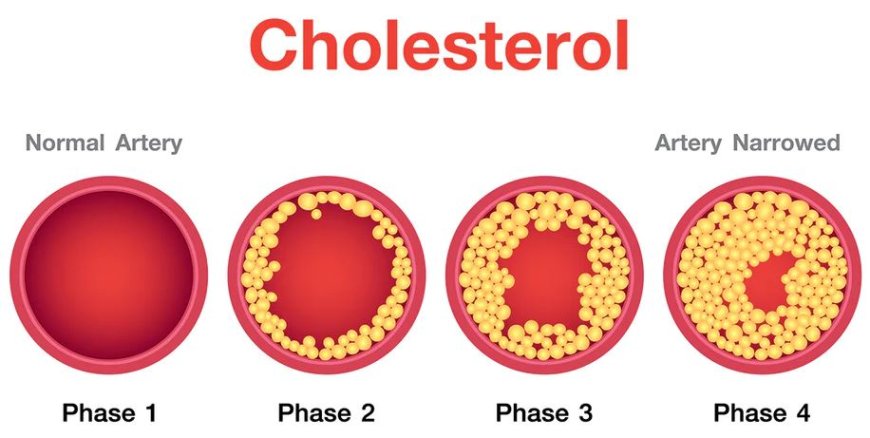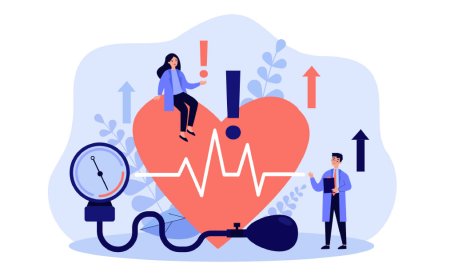Cholesterol is like a special type of fat that our body needs to stay healthy. It's like having two kinds of cholesterol in our body - the "good" and the "bad."
The "good" cholesterol (HDL) is like a superhero that helps our body. It goes around our blood vessels and cleans up the "bad" cholesterol (LDL), which can be like a villain. The "bad" cholesterol can stick to the walls of our blood vessels and make them narrow, like a clogged pipe.
When we have too much "bad" cholesterol and not enough "good" cholesterol, it can be bad for our heart. It can block the blood vessels and make it harder for our heart to pump blood, just like a blocked pipe that slows down the water flow.
Cholesterol comes in two primary types, commonly referred to as "good" cholesterol and "bad" cholesterol:
1.High-Density Lipoprotein (HDL) Cholesterol:
HDL cholesterol is often called "good" cholesterol because it is beneficial for our heart health. HDL cholesterol acts like a superhero, traveling through our bloodstream and picking up excess cholesterol from the blood vessel walls. It then carries this extra cholesterol back to the liver, where it is processed and removed from the body. Having higher levels of HDL cholesterol is linked to a reduced risk of heart disease.
2.Low-Density Lipoprotein (LDL) Cholesterol:
LDL cholesterol is often called "bad" cholesterol because having high levels of it can be harmful to our heart health. LDL cholesterol is like a villain that can stick to the walls of our blood vessels and create plaque. This plaque buildup can narrow the blood vessels and restrict blood flow, increasing the risk of heart problems and diseases. It is essential to keep LDL cholesterol levels in check to maintain good heart health.
Here is image that recommended cholesterol levels for different age groups in milligrams per deciliter (mg/dL):
Please note that these levels are general guidelines and may vary depending on individual health conditions and risk factors. It's essential to work closely with a healthcare provider to determine the appropriate cholesterol levels and develop a personalized plan for managing cholesterol and maintaining heart health.
Managing Cholesterol level:-
1.Adopt a Heart-Healthy Diet:
● Include plenty of fruits, vegetables, whole grains, and legumes in your diet.
● Choose lean proteins like poultry, fish, and plant-based sources instead of red meat.
● Limit saturated and trans fats found in fried and processed foods, cakes, and pastries.
● Use healthier cooking oils like olive oil or canola oil.
● Avoid sugary drinks and opt for water or herbal teas.
2.Get Regular Exercise:
● Engage in physical activity most days of the week. Aim for at least 150 minutes of moderate-intensity exercise or 75 minutes of vigorous-intensity exercise per week.
● Activities like brisk walking, jogging, cycling, swimming, or dancing are great for the heart.
● Regular exercise can raise "good" HDL cholesterol levels and lower "bad" LDL cholesterol levels.
3.Maintain a Healthy Weight:
● If overweight, aim to lose weight gradually through a combination of a healthy diet and regular exercise.
● Losing excess weight can improve cholesterol levels and overall heart health.
4.Avoid Smoking and Limit Alcohol:
● Quit smoking or avoid exposure to secondhand smoke. Smoking can lower "good" HDL cholesterol levels and damage blood vessels.
● If you drink alcohol, do so in moderation. For men, this means up to two standard drinks per day, and for women, up to one standard drink per day.
5.Manage Stress:
● Chronic stress can affect cholesterol levels. Find healthy ways to cope with stress, such as meditation, yoga, or spending time with loved ones.
6.Take Medications as Prescribed:
● If lifestyle changes alone are not sufficient to manage cholesterol levels, your doctor may prescribe medications like statins.
● Take prescribed medications as directed and attend regular check-ups to monitor cholesterol levels.
7.Get Regular Health Check-ups:
● Visit your healthcare provider regularly to monitor cholesterol levels and overall heart health.
● Routine check-ups can help identify any potential issues early on and allow for timely intervention.


 Like
0
Like
0
 Dislike
0
Dislike
0
 Love
0
Love
0
 Funny
0
Funny
0
 Angry
0
Angry
0
 Sad
0
Sad
0
 Wow
0
Wow
0




































































